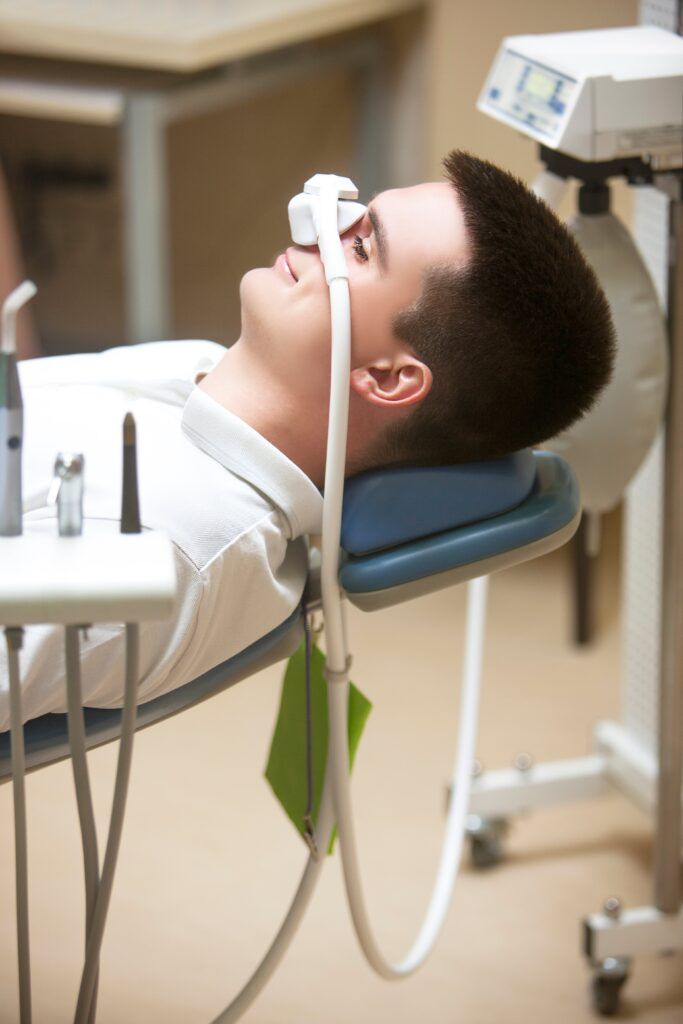Dental anxiety is a common concern that affects many individuals, often preventing them from seeking necessary dental care. The mere thought of sitting in a dentist’s chair can evoke feelings of fear and unease in some people. Not only can dental anxiety lead to a lack of dental care and eventual oral health problems, but it can also prevent people from seeking restorative dental care, such as dental implants. However, modern dentistry has recognized this challenge and offers a solution: dental sedation. This method helps patients relax and undergo dental procedures without the associated stress. In this blog, we’ll explore how dental sedation can be a game-changer for those grappling with dental anxiety.
Understanding Dental Anxiety
Before delving into the solution, it’s essential to understand the problem. Dental anxiety can stem from various sources:
- Past Traumatic Experiences: A painful or uncomfortable past dental procedure can leave a lasting impression.
- Fear of Pain: The anticipation of pain, even if unfounded, can be a significant deterrent.
- Loss of Control: Lying back in a dental chair and allowing someone to work inside your mouth can make some feel vulnerable or out of control.
- Embarrassment: Some people might feel self-conscious about the state of their teeth or their oral hygiene.
Dental anxiety can have far-reaching consequences on an individual’s oral health. This intense apprehension can lead to prolonged dental neglect, as the mere thought of visiting a dentist becomes an overwhelming ordeal. As a result, minor dental issues that could have been addressed promptly may escalate into severe problems. Moreover, this avoidance behavior can prevent individuals from seeking restorative dental care, such as dental implants, even when it’s crucial for their oral health and overall well-being. The irony is that while the fear intends to avoid pain or discomfort, the delay often results in more extensive procedures later on, perpetuating the cycle of anxiety. The ripple effect of dental anxiety, thus, not only compromises the health of one’s teeth and gums but can also rob them of the confidence that comes with a healthy smile.
What is Dental Sedation?
Dental sedation refers to the use of medications to relax and calm a patient before and during a dental procedure. Dental sedation comes in various forms, each designed to help patients relax to varying degrees during dental procedures. Here are the primary types of dental sedation and their descriptions:
Nitrous Oxide (Laughing Gas):

- Description: Nitrous oxide, commonly known as laughing gas, is a mild sedative inhaled through a mask placed over the nose. It helps patients relax during the procedure.
- Effects: The effects are mild and wear off quickly once the mask is removed, allowing patients to drive themselves home after the appointment.
Oral Sedatives:
- Description: These are medications taken orally, usually in pill form, before the dental procedure. Common oral sedatives include Valium, Ativan, and Halcion.
- Effects: Depending on the dosage, the sedation can range from mild to moderate. Patients might feel drowsy but will still be awake. Due to the sedative effects, patients are advised to have someone accompany them to and from the appointment.
IV Sedation:
- Description: This type of sedation is administered directly into the bloodstream through an intravenous (IV) line. The dentist can adjust the level of sedation in real-time.
- Effects: IV sedation offers a deeper state of relaxation, and patients may not remember much of the procedure. It’s essential for patients to arrange transportation home after undergoing IV sedation.
General Anesthesia:
- Description: General anesthesia renders the patient completely unconscious. It’s typically reserved for extensive surgeries or for patients who cannot be sedated using other methods.
- Effects: Patients will not be aware of the procedure and will not remember it afterward. Recovery from general anesthesia takes longer, and patients will need someone to drive them home and monitor them for a few hours post-procedure.
Conscious Sedation:
- Description: This is a moderate level of sedation where patients remain awake and can respond to commands, but they are in a deeply relaxed state.
- Effects: Conscious sedation can be achieved using various methods, including oral sedatives or IV sedation. Patients might not remember the procedure and will need assistance getting home.
It’s important to note that the type of sedation used often depends on the patient’s needs, the nature of the dental procedure, and the dentist’s recommendation. Always consult with a dental professional to determine the most appropriate sedation method for your specific situation.
How Dental Sedation Can Help
Dental sedation offers a transformative solution for individuals grappling with dental anxiety. Here’s how it can help:
Alleviates Anxiety and Fear:
The primary purpose of dental sedation is to induce a state of deep relaxation. This ensures that patients remain calm and comfortable, reducing or even eliminating the feelings of dread and apprehension associated with dental procedures.
Pain Management:
One of the significant sources of dental fear is the anticipation of pain. Dental sedation not only calms the nerves but also acts as a pain suppressor, ensuring that patients experience minimal to no discomfort during the procedure.
Efficient Treatment:

With the patient in a relaxed state, dentists can work more effectively, often completing procedures faster than they would without sedation. This means fewer visits and less time in the dental chair, which is a relief for many anxiety-prone patients.
Memory Suppression:
Some forms of sedation, especially deeper sedation methods, can lead to patients having little to no memory of the procedure. For those with severe dental phobias, not remembering the treatment can be a significant advantage.
Increased Cooperation:
Anxiety can sometimes lead to involuntary movements or difficulty in cooperating with the dentist’s instructions. Sedation helps in reducing these reflexes, allowing for a smoother procedure.
Broadens Treatment Options:
Some individuals may avoid certain treatments due to fear, even if those treatments are the best options for their oral health. With sedation, they can comfortably undergo a wider range of procedures, including more complex ones like dental implants or oral surgeries.
Breaks the Cycle of Avoidance:
By offering a more pleasant and stress-free dental experience, sedation can help break the cycle of avoidance. Over time, patients may find that they no longer dread dental visits as they once did, leading to more regular check-ups and better oral health.
In essence, dental sedation acts as a bridge, allowing patients to overcome their fears and access the dental care they need. It’s a tool that, when used appropriately, can transform the dental experience from a source of anxiety to one of comfort and ease.
Is Dental Sedation Right for You?
Determining whether dental sedation is right for you involves considering several factors:
- Nature of the Procedure: If you’re undergoing a more invasive or lengthy procedure, sedation might be recommended to ensure your comfort throughout the process.
- Level of Anxiety: Dental sedation is particularly beneficial for those with dental phobias or severe anxiety. If the mere thought of a dental visit makes you extremely anxious, sedation can help you undergo necessary treatments without undue stress.
- Medical History: Your overall health and medical history play a crucial role. Some medical conditions or medications might interact with sedatives, so it’s essential to discuss these with your dentist.
- Pain Threshold: If you have a low pain threshold or are sensitive to discomfort, sedation can help make the experience more bearable.
- Previous Dental Experiences: If you’ve had traumatic dental experiences in the past, sedation can help you overcome any residual fear or hesitation.
- Cost and Insurance: Some dental sedation methods can be costly, and not all insurance plans cover them. It’s essential to consider the financial aspect and check with your insurance provider.
- Recovery Time: Some sedation methods, like general anesthesia, require more extended recovery times. You’ll need to ensure you have someone to drive you home and monitor you for a few hours post-procedure.
- Personal Preference: Some people prefer to be fully aware during their dental procedures, while others would rather not remember anything. Your personal comfort and preferences are vital.
In conclusion, while dental sedation offers numerous benefits, it’s not suitable for everyone. It’s essential to have an open discussion with your dentist about your concerns, medical history, and any other relevant factors. Together, you can make an informed decision about whether dental sedation is the right choice for you.
In Conclusion
Dental anxiety shouldn’t stand in the way of achieving optimal oral health. With dental sedation, patients can receive the dental implant care they need in a relaxed and comfortable environment. If you or someone you know struggles with dental anxiety, consider discussing dental sedation options with a dental implant professional like Dr. Atcha. Your smile is worth it!

